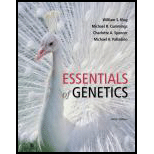
Concept explainers
CASE STUDY | To test or not to test
Thomas first discovered a potentially devastating piece of family history when he learned the medical diagnosis for his brother's increasing dementia, muscular rigidity, and frequency of seizures. His brother, at age 49, was diagnosed with Huntington disease (HD), a dominantly inherited condition that typically begins with such symptoms around the age of 45 and leads to death in one's early 60s. As depressing as the news was to Thomas, it helped explain his father's suicide. Thomas, 38, now wonders what his chances are of carrying the gene for HD, leading him and his wife to discuss the pros and cons of him undergoing genetic testing. Thomas and his wife have two teenage children, a boy and a girl.
What role might a genetic counselor play in this real-life scenario?
To review:
The role or the job of a genetic counselor.
Introduction:
Genetics is a part of science that deals with the study of the genetic material of an organism. This science also involves studying the genetic variation, mutations, and their inheritance. Genetic studies are not just important in theory but have many practical aspects to it. For example, the study of genes is important in agriculture to develop better varieties of crops, and in medicine to treat diseases.
Explanation of Solution
The term genetic counselor is given to a person who helps to provide information on a genetic condition to any patientwho may be prone to or might be going through. This they do by performing genetic tests, analyzing the data, analyzing the history of the patient’s family for genetic disorders like cancers, other diseases like muscular dystrophy, cystic fibrosis, etcetera, and then educating the patient for the same. Their job is not to tell the patient what decision they should take, but just to make the information available and talk them through difficult decisions.
They usually work in hospitals or clinics or genetic laboratories and help the patients to tackle the results of the diagnosis.
Thus, it can be concluded thata genetic counselor is the one who provides the patient with the important information of the genetic disorder to the patient might be suffering through or be prone to that disease. They also help to deal with the emotional setbackthat the patient goes through after the diagnosis.
Want to see more full solutions like this?
Chapter 3 Solutions
Essentials of Genetics (9th Edition) - Standalone book
- Define the terms regarding immunoglobulin G: Fab, Fc, and F(ab’)2.arrow_forwardquestions about GMOs (genetically modified organisms): (1) Explain the agrobacterium-based method for GMO development. (2) What are the criteria that determine the safety of GMOs? (3) Explain how to differentiate GMO from non-GMO productarrow_forwardExplain the principle of lateral flow assay (LFA) used as a point-of-care testing (POCT) technology.arrow_forward
- The following is the partial sequence of a bacterial gene ORF: 5’ --------------------CGGAATTCCCGGGGATCC------------------------3’ (The remaining sequence of the gene ORF never affects the cloning of this gene. The multiple cloning sites of the plasmid vector can be cleaved by 8 restriction endonucleases that are listed in the table. 5’- and 3’-end sequences of the bacterial gene ORF are 5’ ATGGAGT TATCCAGGTGCCT--- and 3’AATATGGAGTTATCCAGGTGCCT---, respectively. After choosing the appropriate restriction endonuclease(s) for directional cloning using the table below, determine the sequences of two 20-mer primers used for the PCR amplification of the gene ORF.arrow_forwardExplain the terms: SNP and precision medicinearrow_forwardExplain the terms: innate immunity, adaptive immunity, major histocompatibility complex (MHC), and CAR-T.arrow_forward
- For what purposes of preclinical and clinical trial phases I, II, and III are required in steps to marketing a therapeutic pharmaceutical?arrow_forwardThe following is the partial sequence of a bacterial gene ORF: 5’ --------------------CGGAATTCCCGGGGATCC------------------------3’ (The remaining sequence of the gene ORF never affects the cloning of this gene. The multiple cloning sites of the plasmid vector can be cleaved by 8 restriction endonucleases that are listed in the tableCompare the cloning efficiencies: SmaI vs. EcoRI.arrow_forwardExplain the term, induced pluripotent stem (iPS) cells.arrow_forward
- The 2-dimensional electrophoresis (2-DE) and chromatography are the key technologies useful for proteomics. (1) Explain the protein separation principles of 2-DE. (2) Explain the separation principles of the following four chromatographic protein purifications: ion exchange, hydrophobic interaction, affinity, and gel filtration.arrow_forwardThe repeated external causes such as (1), (2), and (3) in the figure below may result in the generation of cancer cells. (1) What are (1), (2), and (3) in the figure? (2) State three main characteristics (A), (B), and (C) that differentiate cancer (malignant tumor) cells from normal cells.arrow_forwardExplain the function of selectable genetic markers and why they should be contained.arrow_forward
 Human Heredity: Principles and Issues (MindTap Co...BiologyISBN:9781305251052Author:Michael CummingsPublisher:Cengage Learning
Human Heredity: Principles and Issues (MindTap Co...BiologyISBN:9781305251052Author:Michael CummingsPublisher:Cengage Learning
